Items filtered by date: February 2016
Carmelo Anthony suffers Sprained Ankle
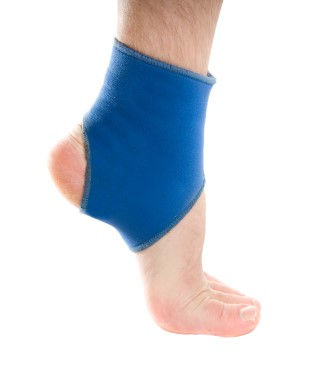 Carmelo Anthony of the Knicks was unable to continue playing in the game against the Boston Celtics following a sprained ankle injury. He had to have his right ankle inspected and treated following the event of his injury. Anthony has also sat out the game against Cleveland in December, and is predicted to have to sit out for recovery for about three days before the Nets game.
Carmelo Anthony of the Knicks was unable to continue playing in the game against the Boston Celtics following a sprained ankle injury. He had to have his right ankle inspected and treated following the event of his injury. Anthony has also sat out the game against Cleveland in December, and is predicted to have to sit out for recovery for about three days before the Nets game.
Ankle sprains are common, but need immediate attention. If you are experiencing pain, consult with Dr. Michael E. Newman of Pennsylvania. Our doctor will assist you with all of your foot and ankle needs.
How Does an Ankle Sprain Occur?
Ankle sprains take place when the ligaments in your ankle are torn or stretched beyond their limits. There are multiple ways that the ankle can become injured, including twisting or rolling over onto your ankle, putting undue stress on it, or causing trauma to the ankle itself.
What are the Symptoms?
- Mild to moderate bruising
- Limited mobility
- Swelling
- Discoloration of the skin (depending on severity)
Preventing a Sprain
- Wearing appropriate shoes for the occasion
- Stretching before exercises and sports
- Knowing your limits can aid in prevention
Treatment of a Sprain
Treatment of a sprain depends on the severity. Many times, people are told to rest and remain off their feet completely, while others are given an air cast. If the sprain is very severe, surgery may be required.
If you have suffered an ankle sprain previously, you may want to consider additional support such as a brace and regular exercises to strengthen the ankle.
If you have any questions please feel free to contact our offices located in Plymouth Meeting and Ambler, PA. We offer the newest diagnostic tools and technology to treat your foot and ankle needs.
“Fallen Arches”: Treat Flat Feet Early On
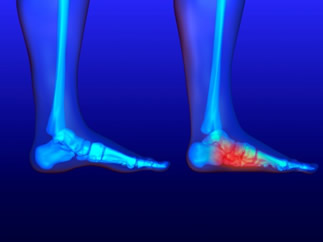 Also known as fallen arches, flat feet can become problematic when you stand or walk. Flat feet can develop as a hereditary condition but can also be caused by not properly maintaining your feet. Poorly-fitting shoes, obesity, or constant pressure on the feet can all lead to the development of flat feet. Flat feet can progress over time and can result in pain or muscular and structural imbalance. Symptoms of flat feet include your feet getting tired often, toes pointing outward, bunion growth, or any other physical irregularity about your feet. Treatment for flat feet include pain medication, custom orthotics, and therapy.
Also known as fallen arches, flat feet can become problematic when you stand or walk. Flat feet can develop as a hereditary condition but can also be caused by not properly maintaining your feet. Poorly-fitting shoes, obesity, or constant pressure on the feet can all lead to the development of flat feet. Flat feet can progress over time and can result in pain or muscular and structural imbalance. Symptoms of flat feet include your feet getting tired often, toes pointing outward, bunion growth, or any other physical irregularity about your feet. Treatment for flat feet include pain medication, custom orthotics, and therapy.
Most arches will develop in children after a certain age. If you have any concerns about your feet or ankles, visit Dr. Michael E. Newman of Pennsylvania. Our doctor will assess your injury and provide you with quality treatment.
What are Flat Feet?
Flat feet are a condition in which the arch of the foot is depressed and the sole of the foot is almost completely in contact with the ground. Standing about 20-30% of the population generally has flat feet because their arch never formed during growth.
Conditions & Problems:
Having flat feet makes it difficult to run or walk because of the stress placed on the ankles.
Alignment – The general alignment of your legs can be disrupted, because the ankles move inward which can cause major discomfort.
Knees – if you have complications with your knees, flat feet can be a contributor to arthritis in that area.
Symptoms:
Pain around the heel or arch area
Trouble standing on the tip toe.
Swelling around the inside of the ankle.
Flat look to one or both feet.
Having your shoes feel uneven when worn
Treatment:
If you are experiencing pain and stress on the foot you may weaken the posterior tibial tendon, which runs around the inside of the ankle.
If you have any questions please feel free to contact our offices located in Plymouth Meeting and Ambler, PA. We offer the newest diagnostic tools and technology to treat your foot and ankle needs.
Certain Superfoods can help ease Arthritis
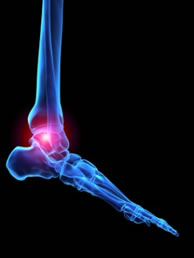 According to research conducted in the UK, a diet rich in cherries, ginger, tumeric, kale, garlic, olive oil, sardines, and Brazil nuts can reduce the pain of inflammation in arthritis patients. These so called “superfoods” in addition to the proper care and medication can have major positive differences in arthritis progression. The reason these foods work so well is due to their richness in antioxidants, anthocyanins, and damage limiting enzymes.
According to research conducted in the UK, a diet rich in cherries, ginger, tumeric, kale, garlic, olive oil, sardines, and Brazil nuts can reduce the pain of inflammation in arthritis patients. These so called “superfoods” in addition to the proper care and medication can have major positive differences in arthritis progression. The reason these foods work so well is due to their richness in antioxidants, anthocyanins, and damage limiting enzymes.
Arthritis can be a difficult condition to live with. If you are seeking treatment, visit Dr. Michael E. Newman of Pennsylvania. Our doctor will assess your injury and provide you with quality treatment.
Arthritic Foot Care
Arthritis is a joint disorder that involves inflammation of different joints in your body, such as in your feet. Arthritis is often caused by a degenerative joint disease and causes mild to severe pain in all affected areas. On top of this, swelling and stiffness in the affected joints can also be a common symptom of arthritis.
In many cases, wearing ill-fitting shoes can worsen the effects and pain of arthritis. Wearing shoes that have a lower heel and extra room can help your feet feel more comfortable. In cases of rheumatoid arthritis, the arch in your foot may become problematic. Buying shoes with proper arch support that contour to your feet can help immensely.
Alleviating Arthritic Pain
- Exercises that stretch the foot can prevent further pain and injury and increase mobility
- Most of the pain can be alleviated with anti-inflammatory drugs, heat, and topical medications
- Massages can help to temporarily alleviate pain.
It is best to see your doctor for the treatment that is right for your needs and symptoms. Conditions vary, and a podiatrist can help you determine the right method of care for your feet.
If you have any questions please feel free to contact our offices located in Plymouth Meeting and Ambler, PA. We offer the newest diagnostic tools and technology to treat your foot and ankle needs.
Costs of Toenail Fungus Treatments
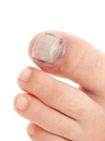 While there are many remedies to toenail fungus, the costs and damages do tend to rack up. It is estimated that the cost of treating one nail can range from $2000 to $10 for pills that can cause severe damage to bodily functions. While the pill is often the go to option, many individuals are apprehensive to take it since it can cause liver damage and the test necessary to administer the drug cost up to $148. Jublia, a topical treatment that is both expensive and not guaranteed to work, is often used more due to its less damaging effects.
While there are many remedies to toenail fungus, the costs and damages do tend to rack up. It is estimated that the cost of treating one nail can range from $2000 to $10 for pills that can cause severe damage to bodily functions. While the pill is often the go to option, many individuals are apprehensive to take it since it can cause liver damage and the test necessary to administer the drug cost up to $148. Jublia, a topical treatment that is both expensive and not guaranteed to work, is often used more due to its less damaging effects.
While toenail fungus is troublesome to eradicate, doing so is not impossible. For more information about treatment, consult with Dr. Michael E. Newman of Pennsylvania. Our doctor will attend to all of your podiatric needs.
Toenail Fungus Treatment
Toenail fungus is a problem which affects many people and is hard to get rid of. Fortunately, there are several methods to go about treating toenail fungus.
Antibiotics & Treatments
Lamisil – is the most commonly effective treatment for toenail fungus. It is available as an antibiotic Terbinafine tablet and cream. Terbinafine is a chemical component which kills fungal growth on the body. Applying regular doses will gradually kill the fungal growth. It is important to keep the area clean and air free.
Talcum powder – applying powder on the feet and shoes helps keep the feet free of moisture and sweat.
Sandals or open toed shoes – wearing these will allow air movement and help keep feet dry. They also expose your feet to light, which fungus cannot tolerate. Socks with moisture wicking material also help as well
Alternative Treatments
There are always surgical procedures that are available for toenail fungus. Some people would like immediate quick removal of toenail fungus. Surgeons will be able to cut through and remove the growth using laser surgery. It is important not to try and remove it yourself. Once removed, your old shoes will need to be replaced to avoid reinfection.
If you have any questions please feel free to contact our offices located in Plymouth Meeting and Ambler, PA. We offer the newest diagnostic tools and technology to treat your foot and ankle needs.
Orthoses and Osteoarthritis Prevention
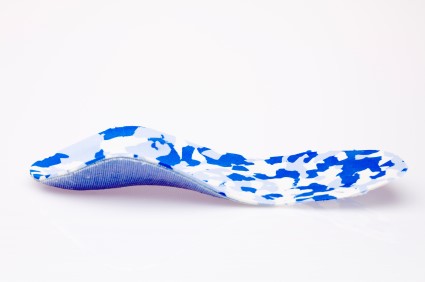 Orthoses are great for managing conditions such as osteoarthritis. Osteoarthritis is thought to occur in “more than one-third of individuals age 35 and older.” Orthoses are customized footwear that can help reduce pain that patients experience from foot conditions such as osteoarthritis. Foot orthoses are suggested to help minimize joint compression by offering support for the person’s gait.
Orthoses are great for managing conditions such as osteoarthritis. Osteoarthritis is thought to occur in “more than one-third of individuals age 35 and older.” Orthoses are customized footwear that can help reduce pain that patients experience from foot conditions such as osteoarthritis. Foot orthoses are suggested to help minimize joint compression by offering support for the person’s gait.
For more information about treatment, consult with Dr. Michael E. Newman of Pennsylvania. Our doctor will attend to all of your podiatric needs.
What are Orthotics?
Orthotics are inserts, prescribed or over the counter, that you can place into your shoes to help with a variety of foot problems such as flat feet or foot pain. Orthotics provide relief and comfort for minor foot and heel pain, but are unable to correct serious biomechanical problems in your feet.
Over-the-Counter Inserts
Orthotics come in a wide variety of over-the-counter inserts that are used to treat foot pain, heel pain, and minor problems. For example, arch supports can be inserted into your shoes to help correct over arched or flat feet, while gel insoles are often used because they provide comfort and relief from foot and heel pain by alleviating pressure.
Prescription Orthotics
If over-the-counter inserts don’t work for you, or if you have a more severe foot issue, it is possible to have your podiatrist prescribe custom orthotics. These high quality inserts are designed to treat problems such as abnormal motion, plantar fasciitis, and more severe heel pain. They can even be used to help patients suffering from diabetes by treating foot ulcers and painful calluses, and are usually molded to your feet individually, which allows them to provide full support and comfort.
If you are experiencing minor to severe foot or heel pain, it’s recommended to speak with your podiatrist on the possibilities of using orthotics. A podiatrist can determine which type of orthotic is right for you and allow you to take the first steps towards being pain free.
If you have any questions please feel free to contact our offices located in Plymouth Meeting and Ambler, PA. We offer the newest diagnostic tools and technology to treat your foot and ankle needs.
